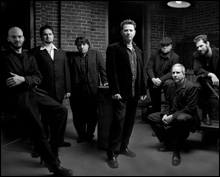
THE REAL THING: Great soul music is organic and cool and funky and you can dance to it,” says Brad Hallen .
|
It’s clear from the first refrain of Joe South’s “Walk a Mile in My Shoes” that the Soul Band don’t fool around. Singer Tim Pike has a mighty rasp that strolls in the shadows of the classic voices of ’60s greats like Joe Tex and Wilson Pickett. The brotherly horns of Scott and John Aruda punch as if these native New Englanders were refugees from Muscle Shoals. Bassist Brad Hallen and drummer Steve Chaggaris nail the grooves that made labels like Stax and Hi part of the American primal R&B vocabulary. And keyboardist Ken Clark and guitarist Mike Welch slip between all the cracks, offering terse lines and colors and rhythm riffs.Their résumés are impressive too: Clark has worked with David “Fathead” Newman and Melvin Sparks, Hallen most recently with Roomful of Blues, Welch has toured the US and abroad as a guitar hero, and on the list goes. They call themselves the Soul Band because that’s their specialty: classic soul music from the ’60s with an occasional left turn like their earthy treatment of U2’s “Sometimes You Can’t Make It on Your Own.” And the South song that the first Elvis made famous kicks off their debut CD, Certified (Bird Egg), by trumpeting the arrival of a vintage sound that’s rarely played by musicians with this band’s deep grooves.

Still, when Hallen, Pike, Clark, and I meet at Davis Square’s Someday Café for java and jawing, my first question is: why record an album of 40-year-old soul covers in almighty 2006? “It’s great music, still very popular and played by a lot of people, but there’s a major difference in what we’re doing,” Clark responds. “We’re paying attention to this music’s integrity, taking it seriously artistically. A lot of musicians play R&B because they think it’s easy, and they’ll straighten out its complicated grooves because they think more people will dance, and it goes downhill from there. When you’re on a gig with musicians like that, you start wondering if you’re crazy. It’s like, ‘This is a beautiful song . . . what’s happening to it?’ We pay attention to the details and play these songs right, with all the right stops and accents and details. We pay the music the respect and attention it deserves.”
“Plus, it’s timeless,” Hallen slips in. “When we play our regular gig on Thursdays at Marco Polo in Ipswich, we’re astonished by the number of young people who come and dance all night. I think people are starved for music that has integrity. They’re getting sick of the commercial rock sound — over-compressed with 27 layers of pop guitar noise in the background. Great soul music is organic and cool and funky and you can dance to it. It reaches out.”
True enough. But too many contemporary blues and R&B bands have forgotten that during its golden years this music was always about songs. That notion first became diluted by the second wave of the British blues invaders of the ‘60s, outfits like Led Zeppelin, Cream, and the Jeff Beck Group and American ex-pat Jimi Hendrix, who were adventurous and justified departures. But in their wake, and once again after the death of Stevie Ray Vaughan in 1990, hundreds — if not thousands — of lesser musicians took the work of those extraordinary performers as license for lame, self-indulgent instrumental filibusters. Just as foul are the reverent blues players who treat the music as if it were a dusty museum piece and bring nothing of themselves to the stage.
It’s a rare Soul Band tune that hits the three-and-a-half-minute mark. They’re dedicated to expressing themselves within existing musical blueprints, the way trained classical musicians do. But their tastes aren’t completely mired in the past.
“There’s a great new generation of R&B songwriters and performers,” Pike says. “D’Angelo has some great records. Joss Stone’s having an impact on the mainstream.”
“Kanye West is great,” Hallen interjects. “And Joe Henry is doing some amazing work: he’s trying to keep real soul music alive in the albums he’s produced for Solomon Burke, Bettye LaVette, and the last Susan Tedeschi CD. The album he just did with Irma Thomas, Mavis Staples, and Allen Toussaint is killer.”
“I’ll explain why there’s no original songs on our album,” Hallen continues, shifting the subject. “We were offered a chance to record, and we had a very small window when we were all available, because everybody in this band has multiple gigs outside the group. If we waited to work up some songs, we might have lost that window. So we just picked a bunch of numbers we love and started recording. Originals will be on the agenda for the second record, when we’ve got more time. The fact is, this music is simple but it’s not easy. From a historic point of view, we based Certified on the Memphis sound from the mid to late ’60s — a period when the Stax, Hi, and Goldwax labels were in blossom. All this was happening within a couple of square miles, and each sound and approach was completely different. That’s a lot of great art at one place at one time — just like Chicago with blues in the 1950s. I’m hoping that people who hear us will be interested in checking that out.